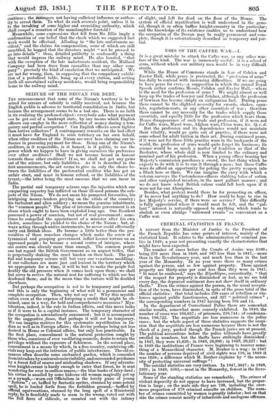SEIZURE OF THE DECCAN FOR DEBT.
THE announcement that some of the Nizam's territory is to be seized for arrears of subsidy is coldly received, not because the English public is adverse to territorial consolidation in India, but because the arrangement seems to be a bad one. There is no faith in its realizing the professed object : everybody asks what payment can be got out of a bankrupt state, by any means which English officers can employ in the mere collection of money during a tem- porary and partial. occupation ? Can English officers screw tighter than native collectors? A contemporary remarks on the bad effect it must have for England to seize territory on her own behalf, when other creditors of the Nizam are over here claiming our in- fluence in procuring payment for them. Being one of the Nizam's creditors, is it respectable, is it honest, is it politic, to use the power which we happen to have in giving ourselves the preference over other creditors ? Shall we not become bound in honour towards those other creditors ? If so, we shall not get any gains out of the seizure, but only liabilities. As it is described in the first announcements, the act seems to give us only the choice be- tween the liabilities of the preferential creditor who has got an unfair start, and must in honour refund, or the liabilities of the tyrant,--the latter being the most onerous that we can incur in India.
The partial and temporary seizure caps the injustice which our conquering coquetry has inflicted on those ill-used persons the sub- jects of the Nizam. We do not mean his pampered favourites, his intriguing money-lenders preying on the vitals of the country ; his turbulent and alien soldiery ; we mean the genuine inhabitants, the " common people." The plan of intermediate government is an abuse which ought to have been exploded long ago. Our Resident possessed a power of coercion, but not of real government ; some- times he compelled the appointment of a minister after his own choice, sometimes he yielded to the choice of the Nizam ; but, al- ways acting through native instruments, he never could effectually carry out British ideas. He became a little better than the pro- vocative of those ceaseless changes which make the screw of a tyrannical and grasping government inflict keener torture on an oppressed people ; he became a second centre of intrigue, where one centre was already more than enough. The common people can but regard the British Government as an august trifler, that is perpetually shaking the cruel burden on their back. The par- tial and temporary seizure will but vary our vexatious meddling : if our collectors are more just and lenient in the territory which we appropriate for a time, it will be but to make the people feel doubly the old pressure when it comes back upon them ; we shall but serve to revive the natural zest for suffering to which use has deadened them; and in the mean time the torture will be doubled elsewhere.
But perhaps the occupation is not to be temporary and partial, and this is only the beginning of what will be a permanent and complete occupation. Then, why not say so ? Why this mystifi- cation even at the expense of foregoing a credit that might be ob- tained, once in a way, for bold and comprehensive measures ? Mys- tification, indeed, is the rule in Indian affairs, and this move looks as if it were to be a capital instance. The temporary character of the occupation is ostentatiously announced ; but it is accompanied by the suggestive fame, that perhaps it will not be temporary. We can imagine motives for this systematic mystification in In- dian as well as in Foreign affairs ; the device perhaps being not less desired in Home or Colonial affairs, but only less practicable. In the first place, concealment is the natural protection sought by those who, conscious of ever vacillating councils, desire to retain the Privilege without the exposure of fickleness. In the second place, concealment is a means by which, in a free country, contriving offi- cials may keep out the intrusion of public interference. The old ro- mances often describe some enchanted garden, which is concealed from intruders by a miraculous invisibility, and surrounded perchance by a forest full of snares and misleading shadows. If any adventu- rous knight-errant is hardy enough to enter that forest, he is sent wandering for ever in endless mazes,—the blue books of fairy-land ; his virtue is assailed by some hideous old woman magically got up as a nymph,—worn-out Officialism in the lovely guise of young " Reform ; or, baffled by fantastic sprites, stunned by some potent spell, he is hurled forth from the forbidden ground,—baffied by official equivocations, stunned by the long spell of a Ministerial reply, he is fiendishly made to seem in the wrong, voted out with the full force of ridicule, or counted out with the infamy of slight, and left for dead on the floor of the House. The system of official mystification is well understood in the gene- ral, though it so often baffles knight-errantry in the particular; and the knowledge of its existence enables us to understand how the occupation of the Deccan may be really permanent and com- plete, though it is ostentatiously described as temporary and par- tial.


























 Previous page
Previous page